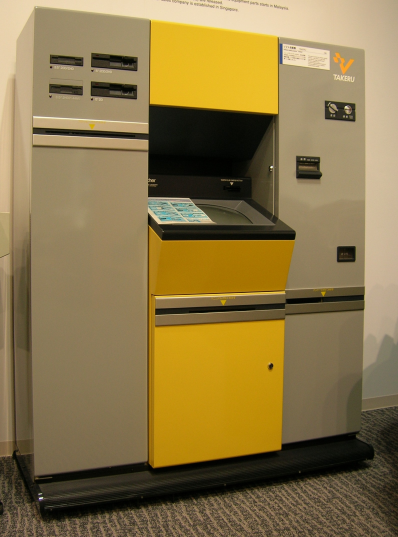

Soft Vendor TAKERU
source link: https://minahito.wordpress.com/2016/08/04/soft-vendor-takeru-the-worlds-first-app-store/
Go to the source link to view the article. You can view the picture content, updated content and better typesetting reading experience. If the link is broken, please click the button below to view the snapshot at that time.
Soft Vendor TAKERU: The world’s first App Store
Soft Vendor TAKERU was the world’s first PC software vendor machine developed by Brother Industries, Ltd. In 1986. It is a page in the Japanese PC history books. It also made a big contribution to Japanese early indie games. But there are few web pages which describe TAKERU. Today I’m writing about this revolutionary machine.

As its name suggests, Soft Vendor TAKERU was a software vendor machine launched 30 years ago. It has a touch-paneled display to order software. I’m explaining how I bought software from TAKERU. At first, I choose PC system (in that time, there was no Windows and no Mac, but many kinds of PC systems there; PC-98, PC-88, MSX, X68000, etc.) and PC software which I wanted to buy. I was X68000 owner, and my model had 5-inch floppy disk drives, so I choose “X68000” and “5-inch.” on the touched-panel.
Next, I needed to insert cash to pay for it. Credit cards were unacceptable, and I didn’t have it because I was a kid.
After payment, the TAKERU gave me some blank floppy disks. I received the disks from a disk outlet and inserted them into an embedded floppy disk drive on the left side. It means TAKERU didn’t have something like auto disk changer. (Such a equipment was so expensive!)
And then TAKERU started receiving software data from the server via a telephone network, formatting the disk and writing data into the disk. In general, PC software consisted of many floppy disks, so I needed to repeat it several times.
How was manual? TAKERU had a laser printer in its body (under the monitor) and printed out manuals on the fly. The printer could print only text. That was simple.
Finally, a box outlet gave me a box to contain the floppy disks and the manual with label seals. I needed to write down the title of software on the labels myself and stuck them on the floppy disks and the box.
A lot of PC shop located TAKERU. It was very convenient for me. 30 years ago, buying PC software/games was tough, especially for minor PC system users. PC-9801 or PC-8801 was major PC system in Japan. PC shops have a lot of software for PC-9801 and 8801. But I was MSX and X68000 users. These PC systems were good for gaming and learning game programming, but minor. However, TAKERU provided MSX games and X68000 games. It made me happy.
TAKERU made a big contribution to Japanese early indie game developers. TAKERU dealt in indie game developers! It needs following steps. Indie developers, Japanese called them Do-Jin (同人) game developers, sent a copy of their game with the manual to Brother Industries, Ltd. They checked the quality of games and added their catalog if the quality was not bad. Developers relieved 70% of sales revenue. That’s interesting. The rate is the same as AppStore!
I loved TAKERU, as a gamer and then a developer. Until I met TAKERU, PC magazines were the only way to publish my game. I had sent the source code of my game to a magazine, and the magazine listed my source code on the magazine. TAKERU changed everything! I got to deal with binary data directly(*). It means I draw graphics, made music and sound and then saved them as binary data on a floppy disk to load later.
(*) In a case of sending the source code to a magazine, I needed to serialize data and embedded them in the source code or make data on runtime like a kind of procedural technology.
By TAKERU, I could earn money from my game. It made me feel confident. This confidence was an illusion, but I left the university and went to Tokyo to find a job in the entertainment industry.
TAKERU stopped all of their services by 1997. The business of TAKERU was in the red, but Brother Industries, Ltd. reused their infrastructure and technologies for JOYSOUND, which is the most popular KARAOKE system in Japan. It has been supporting our entertainment life.
Recommend
About Joyk
Aggregate valuable and interesting links.
Joyk means Joy of geeK